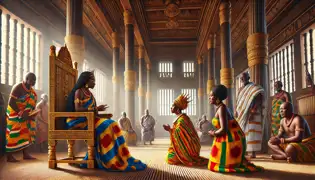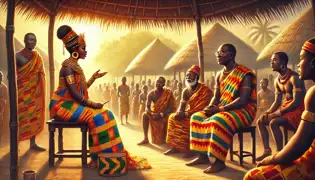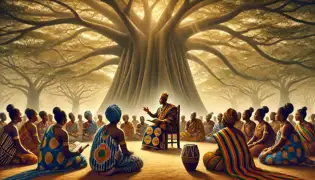In the heart of Ghana’s northern savannah, where rolling plains meet distant hills, lies Mamprugu—a land steeped in history and tradition. Its people, the Mamprusi, live by customs passed down through generations, preserving their connection to the land, ancestors, and the spirits that guide them. At the heart of this kingdom stood the Nayiri, the paramount king, yet even the Nayiri, in his grandeur, leaned on the wisdom of another—Yennaba, the Queen Mother. Yennaba’s journey to becoming the Queen Mother was as extraordinary as the woman herself. She was born in Gumo, a small village where time seemed to flow with the rhythm of nature. Her parents, though not nobility, were revered for their knowledge. Her father was a skilled herbalist who treated the sick with remedies drawn from the land, while her mother wove intricate patterns into kente cloth, each piece a story told in color and thread. Yennaba was curious, often questioning things others accepted without thought. While other children played, she would sit with elders, listening intently to their tales of wars fought, peace brokered, and the sacred bond between the people and their gods. Her questions sometimes unsettled the elders, but they also earned her a reputation for being unusually insightful. Her life changed forever at a royal durbar in Nalerigu, the Nayiri’s seat of power. A disagreement had erupted among the women over the allocation of farmland—a matter delicate enough to risk upsetting the community’s harmony. Though barely a woman herself, Yennaba stepped forward, offering a solution so balanced and fair that it left the crowd in awe. The Nayiri, hearing of her wisdom, summoned her to court. What began as a temporary role soon became permanent as Yennaba’s counsel proved invaluable. Becoming Queen Mother was both an honor and a responsibility. Yennaba was no longer just a woman of the people; she was now their guide, their voice, and often, their shield. Her days were filled with hearing disputes, comforting the grieving, and celebrating the successes of her people. Yet, her greatest challenge was understanding how deeply entrenched the traditions were—some of which kept women and children from reaching their potential. One of Yennaba’s first acts as Queen Mother was to advocate for girls’ education. She faced resistance from elders who believed a girl’s place was in the home, learning the arts of cooking, weaving, and raising a family. “If you educate a girl, you educate a family,” Yennaba would argue tirelessly. To win the people’s trust, she visited villages, speaking not in grand declarations but in simple, relatable terms, using proverbs and folktales. Her efforts slowly bore fruit, and before long, young girls in Mamprugu began learning to read, write, and dream beyond the boundaries of their villages. Yennaba’s influence extended beyond the domestic sphere. When a dispute arose over grazing lands between the Mamprusi and their Dagomba neighbors, it was Yennaba who proposed a solution. She traveled to Tamale, a journey of several days, and met with the Dagomba leaders. She spoke not as an outsider but as a mother, emphasizing the shared lineage of the two peoples and their dependence on one another for survival. Her approach was so disarming that the Dagomba chief, who had been staunchly opposed to compromise, agreed to her terms. Her ability to bridge divides didn’t go unnoticed. Among the elders, she earned the nickname “Ninkooma,” meaning peacemaker, and even the Nayiri sought her counsel in matters of governance. Yet, Yennaba never sought the spotlight. “The best leaders,” she would say, “are those who lead without being seen.” The most defining moment of Yennaba’s life came during a prolonged drought that gripped Mamprugu. For months, the rains failed, and the once-fertile land turned to dust. The people prayed, offered sacrifices, and even sought the help of rainmakers, but the skies remained unforgivingly clear. At a gathering of the royal court, the elders debated whether to summon the spirit of the ancestors through the Dandona, the sacred royal drum. Traditionally, only the Nayiri could authorize its use, and even then, only in times of great crisis. Yennaba, however, spoke up. “The drought threatens not just our crops but our spirit,” she said, her voice calm but firm. “Let the Dandona speak for us.” That night, as the drumbeat echoed through the savannah, Yennaba led the people in a ritual of prayer and song. Her words, a blend of ancient chants and her own poetic invocations, seemed to awaken something deep within the community. Within days, the rains returned, and the people of Mamprugu hailed her as not just a leader but a vessel of divine favor. Despite her many successes, Yennaba’s path was far from easy. Internal factions within the palace sometimes viewed her as a threat, accusing her of overstepping her role. Some elders whispered that her ideas, particularly about women’s rights, were too radical and would upset the balance of tradition. Yennaba met these challenges with quiet resolve, understanding that change often comes at a cost. When colonial administrators arrived in Mamprugu, they sought to impose their own systems of governance, often dismissing the traditional structures as outdated. Yennaba, however, saw an opportunity to adapt. She worked tirelessly to ensure that Mamprusi customs were respected while embracing beneficial aspects of modern governance, such as improved healthcare and infrastructure. Her efforts brought new clinics, better roads, and training for midwives, helping to reduce maternal and infant mortality rates. As Yennaba grew older, she began to focus on preparing the next generation. She formed a council of women elders, mentoring them in leadership, diplomacy, and the art of listening—a skill she believed was the foundation of good governance. She also ensured that her vision of an educated, empowered Mamprugu was embedded in the kingdom’s future by advocating for scholarships for promising young women. When Yennaba passed away, the entire Mamprugu region came to a standstill. Her funeral was not merely a ceremony; it was a celebration of a life lived in service to others. Thousands gathered in Nalerigu, from elders draped in royal kente to children who had only heard stories of her greatness. The Nayiri himself declared, “Yennaba was not just a mother to the palace. She was the mother of all Mamprugu.” Today, Yennaba’s name is spoken with reverence across Mamprugu. Schools and community centers bear her name, and her teachings are passed down as lessons in courage, wisdom, and humility. In the bustling market of Nalerigu, storytellers still recount how a humble girl from Gumo rose to become one of the most powerful and beloved figures in Ghanaian history. Her story reminds us that leadership is not about power but about service, and that even the smallest voice, when guided by wisdom and love, can change the world.The Unlikely Beginnings
Stepping into the Role

The Unseen Leader

The Drought and the Sacred Drum
Trials and Triumphs

A Lasting Legacy

Epilogue
The Queen Mother of Mamprusi
Reading Time: 6 min

About Story: The Queen Mother of Mamprusi is a Historical Fiction Stories from ghana set in the Medieval Stories. This Dramatic Stories tale explores themes of Courage Stories and is suitable for All Ages Stories. It offers Historical Stories insights. The inspiring rise of Yennaba, the Queen Mother who shaped Mamprugu.


















